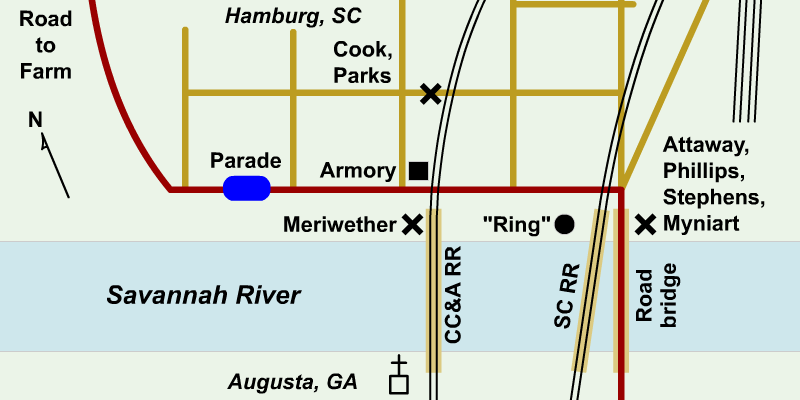On July 8, 1876, the small town of Hamburg, South Carolina erupted in violence as the community’s African American militia clashed with whites from the surrounding area. Hamburg was a small all-black community across the river from Augusta, Georgia. Like many African American communities in South Carolina, it was solidly Republican, and with the GOP in charge in Columbia, some of its men were members of the militia.
On July 4, two white farmers from surrounding Edgefield County, Thomas Butler and Henry Getzen, attempted to drive a carriage through the town along the main road but were obstructed by the all-black militia which was engaged in a military exercise. Although the farmers got through the military formation after an initial argument, racial tensions remained high.
Two days later, Butler and Getzen brought a formal complaint of obstruction of a public road before the local court in Hamburg. The case was postponed until July 8. Matthew C. Butler, an Edgefield attorney, appeared as the farmers’ counsel. Butler demanded that the Hamburg militia company be disbanded although that action had no direct connection to the complaint.
By this point, hundreds of armed white men, including many who were members of various rifle clubs, descended upon the small black community. Militia members retreated to a stone warehouse which they used as their armory.
Sometime during the afternoon a battle ensued. Surrounded and outnumbered, twenty-five militiamen and fifteen Hamburg residents fought back from the armory. By mid-afternoon a white attacker and a militiaman lay dead, and a few more members of the militia were wounded. A cannon was brought over from nearby Augusta and aimed at the armory. As cannon fire blew a hole in the armory, some black militiamen and Hamburg’s Town Marshal, James Cook, attempted to flee. Cook was shot and killed.
The rest of the militiamen and townspeople were captured in the armory. Four of the militiamen were brought out and immediately executed by the white mob. The rest were allowed to escape, though as soon as they began to flee, the whites trained their guns on the escaping men, shooting as many as possible. Seven men died that afternoon. Six were black militiamen or civilians, and one was a white farmer killed in the attack on the armory.
Although blacks were the majority of victims, Wade Hampton, an ex-Confederate general who would run for governor as a Democrat in the fall election, used the Hamburg Massacre to remind the mostly white voters across the state of the racial danger of Republican-controlled government. Hampton and the Democrats won the election and effectively ended Reconstruction in South Carolina.

